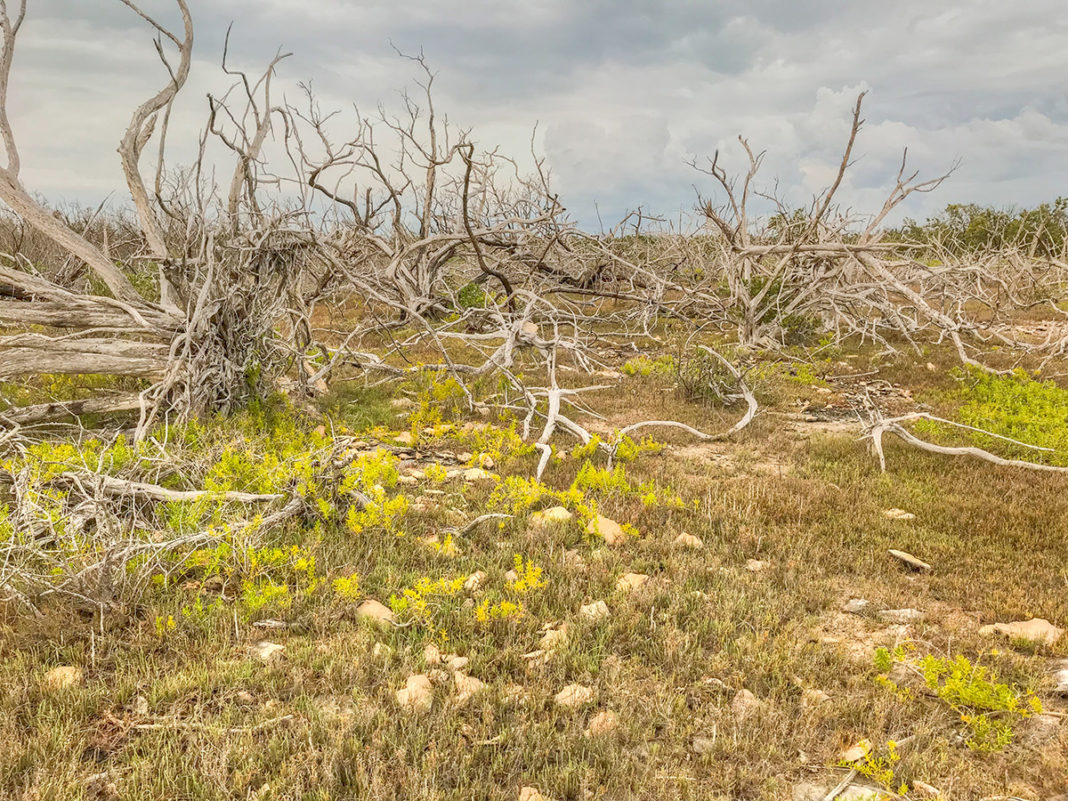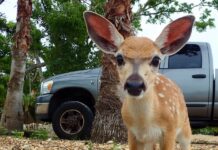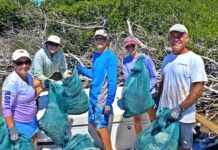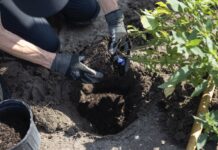By Karuna Eberl
part 2 of 2
Recently an ice shelf collapsed in the Antarctic, bringing the disappearance of the second largest colony of emperor penguins, thousands of chicks and all. What is the relevance to us, 7,000 miles away in the subtropics? Well, something. A rather important something.
In May, we learned that the web of life that holds our planet’s ecosystems intact, and allows us to farm and fish, is on the verge of failure. The reasons: humans have plowed and paved over three quarters of the land, disrupted two-thirds of the oceans, overfished and over-poached. On this course, during the next decade, orangutans, tigers and elephants are expected to become extinct in the wild. A decade or two after that, one in every eight species. That comes out to somewhere around a million kinds of plants and animals, gone. It is on track to be the sixth great planetary extinction.
We are fine. We are Keys strong.
We were leveled by one of the largest hurricanes in history not too long ago, and proved we can survive anything. Here, on this little strip of land, where we are told that the sea is rising all around, many of us are indifferent to climate change. Our lives are busy, our wallets thin, and these problems are nebulous. We hear an armageddon soundbite on the news, a neighbor’s viewpoint, a polarizing talking head. We form an opinion, then move on to other things. Our disconnect with these issues is that they are complex, overwhelming and seemingly far away. Unfortunately, understanding the urgency of what is taking place, and the science behind it, requires considerable effort.
Why spend the time to learn about problems we don’t see here?
Because the problems ARE here. Somewhere upwards of 80 percent of the Keys’ coral has died in the last four decades. Before Irma, we had 6 percent left overall. During that same time, 80 percent of Caribbean reefs have disappeared. There are numerous and complex causes for this, but the science suggests that most of them are human-driven. Elsewhere in the seas, green slime is all that remains of life. At least one third of the Great Barrier Reef has bleached and died since 2016. There are 400 ocean “dead zones,” and growing. Insects have all but vanished in some tropical forests.
This is for real.
Those who’ve been diving or fishing here for 30 years likely remember the clearer water, the larger and more abundant fish, and the vibrancy of corals on the reefs. Or, maybe we don’t. When it comes to nature, people have generational amnesia, or what scientists call shifting baselines. We see a landscape as pristine, because we don’t have a reference for what it was before we experienced it. We also develop what’s been termed “personal amnesia,” where we don’t often notice the gradual decline in abundance of animals and plants through our own lifetimes. But if John James Audubon were to see the Florida Bay today, two centuries later, he would surely note that the ecosystems here have all but crumbled.
(For those keeping score, there are now three cataclysmic pressures on nature: biodiversity collapse, poisoned land and water, and the ever-polarizing climate change. They are all in many ways intertwined, especially in the Keys.)
Ninety percent of shallow-water coral reefs will likely die by 2050, because with business as usual, annual coral bleaching is predicted to be the norm by then. Most corals cannot survive that level of stress.
Another problem we face today is the escalating rate of change. What once took 100 years to break is now taking more like 10 or 20. If we have lost three-quarters of the reef in 40 years, and the rate of loss is increasing, then what will we have left in 20 years, or 10? Our minds are not used to adjusting for an exponentially increasing rate of change. We think what happened in the first half of our lives will be about how it goes down in the second. Science tells us that is simply not the case.
This is for real.
Living in a developed nation, we will be the last to feel the dire effects of these pressures on nature. It’s hard to grasp a melting Greenland, a drying Madagascar, or a valley in China where workers, not bees, pollinate the trees. They are already in the throes of it. By the time we are encapsulated by it, by the time we are truly inconvenienced by contaminated water or in imminent danger of starvation, the situation will be far beyond fixable.
So why are dead emperor penguins important to the Keys? They are our wake-up call. They are our battle cry. The people of the Keys can have all the compassion in the world, for the people of the world, but it means nothing without action.
Starting now, we accept that this is for real.
Our One Human Family doesn’t just extend from mile markers 0 to 107. It includes the Inuit in the Arctic, the eagle hunters in Mongolia, the Bushman of the Kalahari, and everyone in this country, regardless of which politicians or religions they identify with.
People of the Keys, politicians, commissioners, business leaders, snowbirds, and all of us working stiffs, let us lead the world. Let’s make sure the Keys, and everywhere else, are here for the next generations.
It’s not going to be convenient. It’s not going to be easy. But let’s go for it because it is a challenge. Nature is resilient. We have the power to change our planet’s destiny. We are strong. We live on one of the most important barrier reefs in the world. People will listen. They will follow our lead. And all it will take is a conscious decision to put the environment first, above our other squabbles.
Starting now.
— Karuna Eberl is a freelance nature journalist, living on Cudjoe Key. She invites you to email her, join this conversation, bring these issues to the forefront, and help find solutions. mailto:karuna@wanderingdogcreations.com.
























